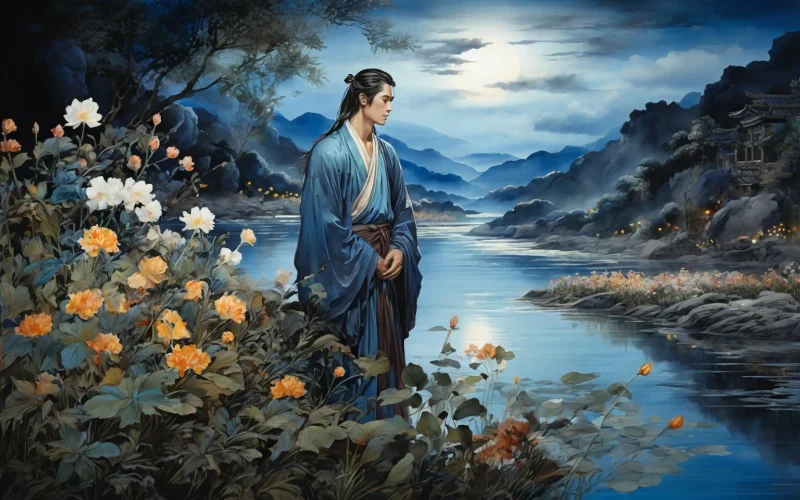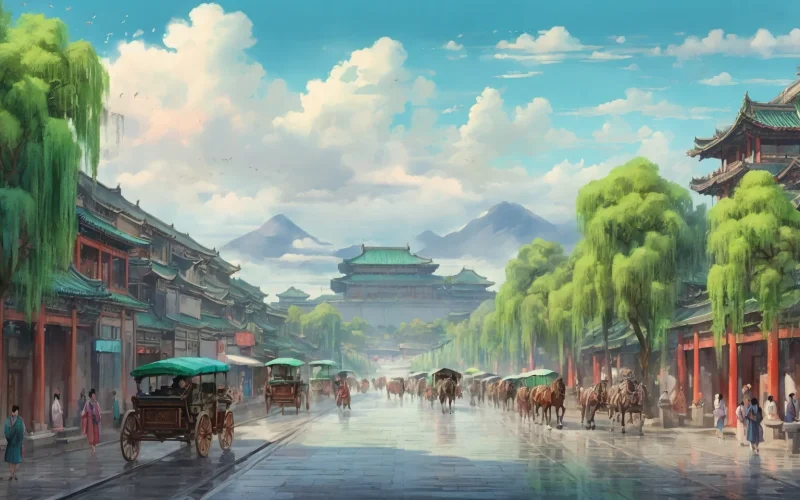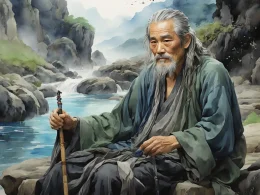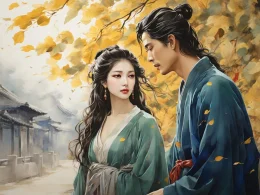While lying idly in the southern bower,
I drew the curtain to watch the rising moon.
Its clear rays brighten water, trees and flower,
And ripple like a stream into my room.
How oft has it waxed and waned in endless flight!
How oft will it shine anew on men long gone!
By riverside you're steeped in its pure light
And croon nostalgic songs the whole night long.
Though you're a thousand miles away, O peer,
The orchid's fragrance wafts e'en to me here.
Original Poem
「同从弟南斋玩月忆山阴崔少府」
王昌龄
高卧南斋时,开帷月初吐。
清辉淡水木,演漾在窗户。
苒苒几盈虚,澄澄变今古。
美人清江畔,是夜越吟苦。
千里其如何,微风吹兰杜。
Interpretation
Composed during the High Tang period, this poem was written by Wang Changling while admiring the moon at South Studio, titled "Enjoying the Moon with My Cousin in the Southern Study and Thinking of Cui in Shanyin" Away from home and moved by the moonlit scene, the poet reminisces about his distant friend. Through delicate depictions of the nocturnal landscape, Wang expresses nostalgic longing while contemplating life's transience—a rare lyrical work showcasing his graceful, refined style beyond frontier poetry.
First Couplet: "高卧南斋时,开帷月初吐。"
Gāo wò nán zhāi shí, kāi wéi yuè chū tǔ.
"As I reclined in South Studio's space, / Drawn curtains revealed the moon's newborn face."
The serene opening establishes setting and time. "Newborn face" (初吐) personifies the rising moon with dynamic elegance, subtly mirroring emerging thoughts.
Second Couplet: "清辉淡水木,演漾在窗户。"
Qīng huī dàn shuǐ mù, yǎn yàng zài chuāng hù.
"Pale radiance bathes trees and streams; / Rippling light through window gleams."
This couplet paints moonlit tranquility—water and wood transformed by ethereal glow, the window framing this meditation-inducing tableau.
Third Couplet: "苒苒几盈虚,澄澄变今古。"
Rǎn rǎn jǐ yíng xū, chéng chéng biàn jīn gǔ.
"How many waxings, wanings pass? / Yet changeless light transcends time's glass."
"Gradual" (苒苒) marks time's flow while "wanings" (盈虚) denotes lunar phases. The moon's eternal clarity contrasts life's impermanence, deepening philosophical resonance.
Fourth Couplet: "美人清江畔,是夜越吟苦。"
Měi rén qīng jiāng pàn, shì yè yuè yín kǔ.
"By clear riverbanks my noble friend / Chants nostalgic poems without end."
"Noble friend" (美人) refers to Cui, imagined similarly pensive. "Yue chant" (越吟) alludes to Zhuang Xi's homesick songs, enriching cultural connotations.
Fifth Couplet: "千里其如何,微风吹兰杜。"
Qiān lǐ qí rú hé, wēi fēng chuī lán dù.
"Across a thousand miles—how fare you now? / Orchid-breeze carries your poetic vow."
The closing query transcends distance through nature's imagery. Orchids and azaleas (兰杜) symbolize Cui's virtue and literary fragrance, suggesting spiritual communion.
Holistic Appreciation
The moon threads through this lyrical progression: from immediate observation to distant remembrance, then metaphysical reflection. Wang immerses in lunar beauty while spiritually connecting with his absent friend. Blending scene and emotion seamlessly, the poem transforms moonlight into a bridge across space and time, balancing philosophical depth with tender nostalgia through exquisite restraint.
Artistic Merits
- Lunar symbolism: The moon integrates physical beauty and emotional longing
- Allusive subtlety: The "Yue chant" reference deepens cultural resonance without ostentation
- Linguistic purity: Unadorned yet profound, with rhythmic variation enhancing musicality
Insights
The poem demonstrates how profound emotion is best conveyed indirectly through natural imagery. Wang's moonlit meditation teaches us to "show" rather than "tell"—letting scenes carry unspoken depth. For writers, it models how to layer meaning through symbolic observation, where every detail whispers more than it declares.
Poem translator
Xu Yuanchong (许渊冲)
About the poet

Wang Changling (王昌龄), circa A.D. 690 - 756, was a native of Xi'an, Shaanxi Province. Wang Changling's poems were mostly about the Border Places, love affairs and farewells, and he was well known during his lifetime. His seven poems are equal to those of Li Bai, and he is known as the “Master of seven lines”.











